TESOL Turns 50: Looking to the Past and the Future
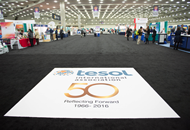 On 5 April, the 2016 TESOL International Convention & English Language Expo opened in Baltimore, Maryland, USA, marking the 50th anniversary of TESOL and 53rd international convention in the association’s history. Baltimore, a city that embraces bilingualism and multicultural education, as well as its own unique linguistic heritage, served as the perfect venue for such a momentous and memorable convention. The convention attracted more than 6,400 professionals and 122 exhibitors, featuring cutting-edge classroom tools and brand new publications. Also featured at the convention was the Job MarketPlace, which attracted 38 recruiting companies and more than 350 job seekers.
On 5 April, the 2016 TESOL International Convention & English Language Expo opened in Baltimore, Maryland, USA, marking the 50th anniversary of TESOL and 53rd international convention in the association’s history. Baltimore, a city that embraces bilingualism and multicultural education, as well as its own unique linguistic heritage, served as the perfect venue for such a momentous and memorable convention. The convention attracted more than 6,400 professionals and 122 exhibitors, featuring cutting-edge classroom tools and brand new publications. Also featured at the convention was the Job MarketPlace, which attracted 38 recruiting companies and more than 350 job seekers.
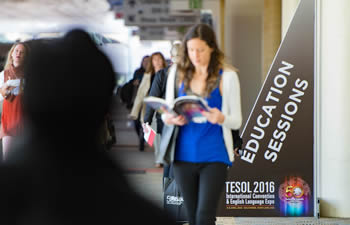
Location and association milestones were not the only highlights of the convention. The programs and sessions not only reflected the diversity of the city and attendees, but provided valuable opportunities to cross beyond familiar borders in the English language teaching and learning field. Approximately 1,000 sessions were offered, ranging from language testing and assessment to technology in language learning, bilingual education, and public policy. Furthermore, the 2016 TESOL International Convention featured nearly two dozen invited speakers, addressing topics such as communication, intercultural awareness, technology, and ELT contexts in Latin America, Southeast Asia, and other locales.
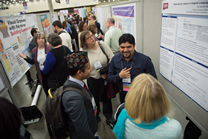 Perhaps the most important takeaway from the 2016 convention was that regardless of how many miles each attendee traveled to get to Baltimore, or their role in the TESOL field, the unifying themes of recognizing quality English language education and a commitment to improve the educational experiences for ELLs remained solid. As the association looks ahead to its 51st annual convention in Seattle, Washington, USA, this commitment to quality English language education will certainly only strengthen and evolve.
Perhaps the most important takeaway from the 2016 convention was that regardless of how many miles each attendee traveled to get to Baltimore, or their role in the TESOL field, the unifying themes of recognizing quality English language education and a commitment to improve the educational experiences for ELLs remained solid. As the association looks ahead to its 51st annual convention in Seattle, Washington, USA, this commitment to quality English language education will certainly only strengthen and evolve.
PreK–12 Day and New Community College Day Kick-Off the 2016 Convention
Alongside the annual PreK–12 Day was the introduction of Community College Day. Community College instructors and administrators were invited to the all-day event held on the eve of convention. The program consisted of 20 workshops on topics ranging from curriculum redesign and grammar instruction to language standards and assessment. The continuation of PreK–12 Day provided teachers and administrators with the opportunity to participate in workshops that concentrated on topics such as ELL teacher evaluations; unaccompanied minors in the United States; and teaching ELL math, writing, and reading.
Convention Highlights and Online Resources
Continuing the trend of past conventions, web access expanded to even more sessions and speakers, including a livestream of each keynote speaker, including Aziz Abu Sarah’s opening keynote, “Revolutionizing Education: Building Peace in a Divided World,” Dr. Jeanette Altarriba’s “Beyond Linguistic Borders: Language Learning Cradled in Language,” Dr. Anne Curzan’s “Survey Says… Determining What English Usage Is and Isn’t Acceptable,” as well as Andy Curtis’s presidential keynote. In case you missed any of the keynotes, webcasts of each keynote can be accessed here. Additionally, session materials, handouts, and presenter contact information can be found here.
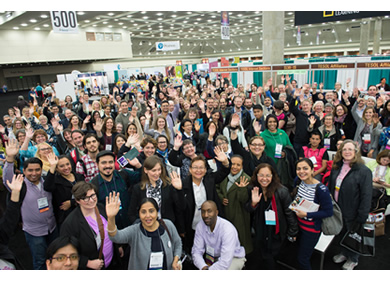
To close the convention, TESOL put on a wonderful celebration to mark its 50th anniversary. While the weather proved to be an adversary, not even an April cold-snap could stop the party. Thousands of members and attendees came to mingle and sample traditional Baltimore delicacies, including a delicious crab dip and ballpark-style hot pretzels and hotdogs. And, of course, no anniversary party would be complete without cake! As the night wound down, songs were sung, friendships were made, and a sense of accomplishment and excitement for the future filled the air. While this was certainly a memorable TESOL convention, there are still more milestones to be reached and more innovations in the field to be made!
“TESOL 2.0: Engage, Enrich, Empower” in Seattle, Washington, USA in 2017

It’s never too early to start planning for next year’s convention, which will head west to Seattle, Washington on 21–24 March 2017. The deadline for all proposal submissions is 1 June 2016. The call for proposals is now available here.
TESOL Blogs
Interested in writing a blog for TESOL?
Read the submission guidelines and send us your post!
Check out the latest TESOL Blogs:
|
Authentic Text Time in Adult Ed, by Robert Sheppard
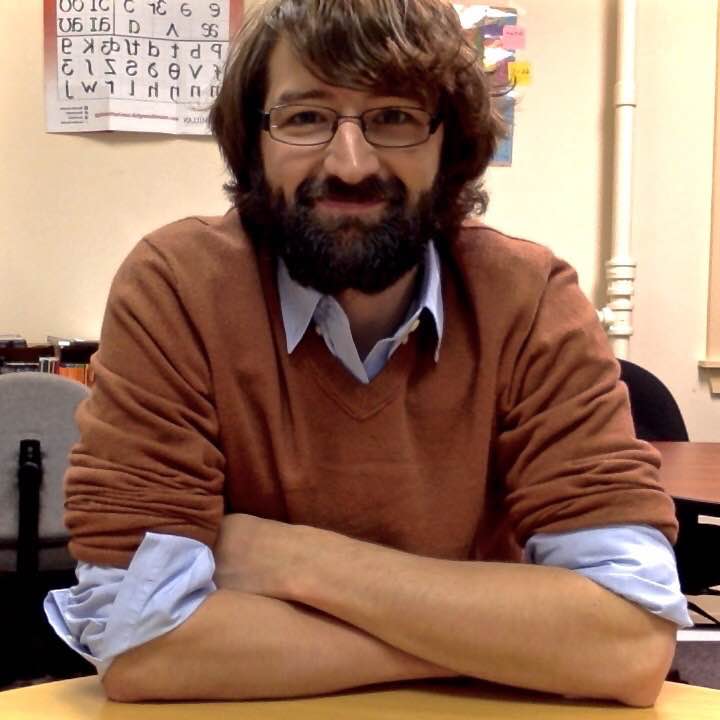 Adult learners, especially immigrants who have various competing priorities which may take precedence over English, need to see an immediate application for their new language. In many contexts, English can be a luxury; for adult immigrants, it cannot be. As teachers, we must approach it with an urgency and immediacy that might be unusual in, say, a business EFL program. A student-driven environmental/authentic text time is one way to add relevance, immediacy, and authenticity to your adult English classes. Read More. Adult learners, especially immigrants who have various competing priorities which may take precedence over English, need to see an immediate application for their new language. In many contexts, English can be a luxury; for adult immigrants, it cannot be. As teachers, we must approach it with an urgency and immediacy that might be unusual in, say, a business EFL program. A student-driven environmental/authentic text time is one way to add relevance, immediacy, and authenticity to your adult English classes. Read More.
|
|
6 Steps to Making New Words Go From Unknown to Acquired, by Nathan Hall
 Years ago, I began Chinese lessons to better understand what it’s like to learn a language. I went from feeling giddy when I recognized a few characters to frustrated at how many I didn’t understand in the time it took to look at the bigger piece. Years later, I can identity many more common characters, but every time I start a new lesson repeat the cycle of going from overconfident to overwhelmed when I see how many new words I have to learn. Years ago, I began Chinese lessons to better understand what it’s like to learn a language. I went from feeling giddy when I recognized a few characters to frustrated at how many I didn’t understand in the time it took to look at the bigger piece. Years later, I can identity many more common characters, but every time I start a new lesson repeat the cycle of going from overconfident to overwhelmed when I see how many new words I have to learn.
That experience made me think about how my students feel when I start previewing vocabulary for a new lesson. The first vocabulary preview can seem intimidating and strange when you don’t recognize anything in the list. Lessons can reinforce what the students learn, but there is a big difference between knowing a word well enough to answer a multiple-choice question and actually adding it into the students’ language repertoire. The result is that students tend to “learn” the word for a short while without “acquiring” it into their developing language. Read More. |
|
Game-Based Learning and Pre-K–5 English Learners, by Judie Haynes
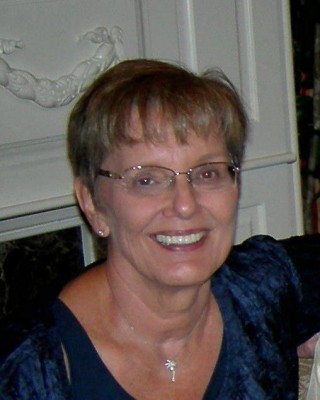 In my previous blogs, I talked about using websites and apps to help elementary-age ELs improve literacy skills. In this blog, I would like to mention some games that support STEM learning for ELs through game-based learning (GBL). GBL is game play that has prescribed learning goals. Activities are designed to balance subject-area learning with games. I think that game-based learning could help ELs learn language and content-area information because it keeps them involved in the learning. GBL can provide students with a context for communicating with their classmates and developing social skills. In my previous blogs, I talked about using websites and apps to help elementary-age ELs improve literacy skills. In this blog, I would like to mention some games that support STEM learning for ELs through game-based learning (GBL). GBL is game play that has prescribed learning goals. Activities are designed to balance subject-area learning with games. I think that game-based learning could help ELs learn language and content-area information because it keeps them involved in the learning. GBL can provide students with a context for communicating with their classmates and developing social skills.
Although GBL is usually associated with middle or high school students, there are many ways it can be used with pre-K–5 students. First, it is important to read some introductory reading to familiarize yourself with basic GBL concepts. Here are a few articles that I recommend: Read More. |
|
9 Strategies for 21st-Century ELT Professionals, by Yilin Sun
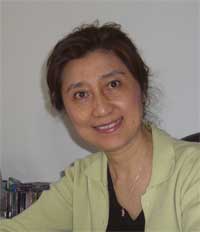 Recently, I gave a keynote talk at the Thai-TESOL 36th Annual Conference (January 2016). It was a well attended conference as Thai-TESOL leaders always do a fantastic job in organizing their annual event. The theme was “Empowerment Through Glocalization,” with the objective focused on how to empower ELT professionals in the changing landscape of ELT. After some contemplation, I came up with nine strategies as number nine is a lucky number in Thai culture. I encourage you to share your thoughts after reading this blog. Recently, I gave a keynote talk at the Thai-TESOL 36th Annual Conference (January 2016). It was a well attended conference as Thai-TESOL leaders always do a fantastic job in organizing their annual event. The theme was “Empowerment Through Glocalization,” with the objective focused on how to empower ELT professionals in the changing landscape of ELT. After some contemplation, I came up with nine strategies as number nine is a lucky number in Thai culture. I encourage you to share your thoughts after reading this blog.
Strategy 1: Value the Changing Perspectives on ELT
About 50 years ago, the ELT field started to see changes in our views of English language learning; this has become more evident over the last 20 years. The old term of ESL has been changed to ELL or EAL (English as an additional language) as ELT educators recognize that many learners know more than two languages and English is not their second language anymore. Read More. |